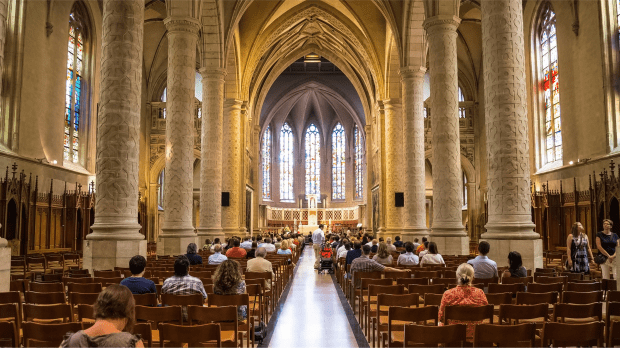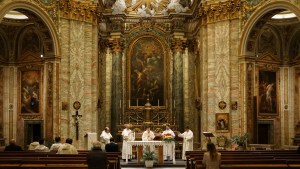The most common name for the liturgy of the Catholic Church is the Mass, but it isn’t the only name.
In fact, the Catechism of the Catholic Church lists seven different names and explains each one and how they are connected.
1The Lord’s Supper
“The Lord’s Supper, because of its connection with the supper which the Lord took with his disciples on the eve of his Passion and because it anticipates the wedding feast of the Lamb in the heavenly Jerusalem.” (CCC 1329)
2The Breaking of Bread
“The Breaking of Bread, because Jesus used this rite, part of a Jewish meal, when as master of the table he blessed and distributed the bread, above all at the Last Supper. It is by this action that his disciples will recognize him after his Resurrection, and it is this expression that the first Christians will use to designate their Eucharistic assemblies; by doing so they signified that all who eat the one broken bread, Christ, enter into communion with him and form but one body in him.” (CCC 1329)
3Eucharistic assembly
“The Eucharistic assembly (synaxis), because the Eucharist is celebrated amid the assembly of the faithful, the visible expression of the Church.” (CCC 1329)
4Memorial
“The memorial of the Lord’s Passion and Resurrection.” (CCC 1330)
5The Holy Sacrifice
“The Holy Sacrifice, because it makes present the one sacrifice of Christ the Savior and includes the Church’s offering. The terms holy sacrifice of the Mass, “sacrifice of praise,” spiritual sacrifice, pure and holy sacrifice are also used, since it completes and surpasses all the sacrifices of the Old Covenant.” (CCC 1330)
6The Holy and Divine Liturgy
“The Holy and Divine Liturgy, because the Church’s whole liturgy finds its center and most intense expression in the celebration of this sacrament.” (CCC 1330)
7Holy Communion
“Holy Communion, because by this sacrament we unite ourselves to Christ, who makes us sharers in his Body and Blood to form a single body.“ (CCC 1331)
8Holy Mass
“Holy Mass (Missa), because the liturgy in which the mystery of salvation is accomplished concludes with the sending forth (missio) of the faithful, so that they may fulfill God’s will in their daily lives.” (CCC 1332)



